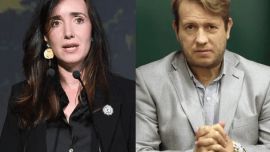Economy Minister Martín Guzmán confirmed bondholders’ worst fears on Wednesday evening, telling them to brace for significant losses as he appeared before Congress to present his fiscal plan.
President Alberto Fernández's government is attempting to restructure a foreign debt of more than US$100 billion. Argentina's total external debt is US$311 billion, according to the latest figures, of which it owes US$44 billion to the IMF.
Speaking before lawmakers, Guzmán said that holders of Argentine debt will probably be disappointed by the restructuring, without providing specifics on how steep losses could be.
“It’s necessary to have a deep debt restructuring,” he said at a congressional hearing where he provided his most detailed comments about debt strategy since taking office in December.
“It’s clear that there’s going to be frustration on the part of bondholders,” he added pointedly.
Echoing the fierce tone of language issued earlier in the week, aimed at creditors, he added: “We’re not going to allow foreign investment funds to set the guidelines on macroeconomic policy.”
Investors have been fearing an aggressive debt restructuring since August, when President Alberto Fernández defeated ex-leader Mauricio Macri in August's PASO primary elections by a far wider margin than any poll had forecast. The peso and sovereign bonds prices have since plunged.
Still the statement will come as a blow to those holding out hope that Fernández would opt for a more moderate stance, with language from the Economy Ministry harshening in tone in recent days.
“There’s a lot of talk about whether the proposal to bondholders will be friendly or aggressive,” Guzman told Congress. “Neither the proposal nor the focus are friendly or aggressive – the focus is on sustainability.”
Haircuts on a tight schedule
The idea of a haircut had been trailed previously by renowned economist Joseph Stiglitz, who suggested weeks ago that significant losses were on the cards.
“The reality is there will have to be significant haircuts,” Stiglitz said in an interview conducted in January at the World Economic Forum in Davos. “I cannot conceive of any reasonable model not saying that there has to be significant haircuts. It would be fantasy to think otherwise.”
Stiglitz’s words certainly carry weight. The Columbia professor mentored Guzmán, who is in charge of renegotiating Argentina‘s debt. They also authored numerous papers together, and after Guzmán’s appointment, Stiglitz wrote an op-ed praising his former mentee.
Guzmán’s comments on Wednesday – delivered at around 5pm as anti-IMF protesters blocked streets and rallied out the National Congress building – sets the tone for tense negotiations with bondholders, among them major investment funds such as BlackRock and Fidelity. He intends to provide a formal offer by the second week of March and finish talks by the end of that month, a timeline many economists say is very tight.
The La Plata-born economist also made clear Argentina won’t continue on the austerity path set in the nation’s record US$56-billion bailout with the International Monetary Fund, which calls for a primary fiscal surplus this year. He said the government won’t reduce its fiscal deficit in 2020 and laid out various scenarios where it would balance its budget over a much longer period of time.
The economy is expected to contract for the third straight year in 2020 with inflation currently above 50 percent, high unemployment and at least third of population living below the poverty line, according to data from the INDEC national statistics bureau.
Although Guzmán spoke positively about the IMF’s new leadership, he also said the institution was partly responsible for Argentina’s economic crisis. An IMF mission team arrived in Buenos Aires Wednesday for its first formal talks with the Fernández administration.
Three paths
Guzmán, 37, provided some specifics investors have yearned to hear. He said Argentina’s bonds under New York laws will not be treated differently than bonds under local law. It wouldn’t be prudent, he added, to provide fiscal forecasts five years or 10 years out while Argentina’s debt remains unsustainable.
Still, the minister posted three possible fiscal paths. In the first, Argentina has a primary fiscal balance by 2026. A second scenario, which he called more realistic, calls for a fiscal primary balance by 2023. A third, harder-to-achieve scenario forecasts a primary balance by 2022.
He also insisted that Argentina does have an economic plan, even though the government hasn’t spelled out any big-picture, medium-term planning since it took office two months ago. Lack of a public plan has left many analysts confused about Fernández’s economic strategy, with the administration seemingly trying to avoid offering definitions.
“There’s a very defined economic programme,” Guzmán emphasized. “Behind absolutely every measure there’s a programme. It’s all thought out.”
Argentina is on the hook for US$38.7 billion in interest and principal payments this year, according to estimates from consulting firm Alberdi Partners. Its US$311 billion gross debt load includes a loan from the IMF, as well as foreign bonds and local-currency borrowings held by both public and private investors.
“The government may be playing its cards close to its chest for now, ready to go in with a detailed and considered plan that has already been developed,” Stuart Culverhouse, head of sovereign and fixed income research at Tellimer, wrote in a report earlier this month.
– TIMES/NA/BLOOMBERG


























Comments